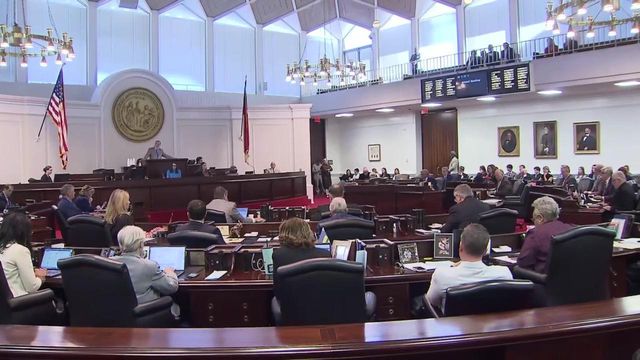Medical marijuana legalization bill passes NC Senate in bipartisan vote
North Carolina senators voted to legalize medical marijuana Tuesday. Polls show it's highly popular, but Republican politicians have been hesitant to approve it until recently.
Posted — UpdatedLast year's bill never moved forward in the House, despite the broad bipartisan support it received in the Senate. House GOP leaders weren’t convinced to make it law.
But supporters have higher hopes this year. Republican Sen. Bill Rabon, a top legislative leader, is the bill’s lead sponsor and recently told reporters that he believes there’s more support in the House GOP than there was last year.
After Tuesday's vote, Senate leader Phil Berger praised Rabon for being able to put together such strong support on a topic that until recently many conservative lawmakers considered a fringe issue.
"A lot of it was his personal story," Berger said of Rabon, who is a cancer survivor. "That carried a lot of people."
In a nod to the opposition the bill still faces in some socially conservative circles, Rabon has repeatedly said he wrote the bill so that if North Carolina does legalize medical marijuana, it would have the strictest rules anywhere in the country.
"The purpose of the bill is to allow for tightly regulated use of medical cannabis, only by those with debilitating illnesses," Rabon said Tuesday on the Senate floor. "... The recreational sale or use of marijuana remains, under this legislation, illegal."
The stricter rules apply to regulations over marketing and on the business side, as well as to the relatively small list of approved ailments that doctors would be allowed to prescribe marijuana to treat. Cancer and post-traumatic stress disorder are on the list, as well as Parkinson’s disease, sickle cell anemia and around a dozen other medical issues.
Not on the list, to the chagrin of some activists, are issues like glaucoma — or medical issues directly tied to the opioid epidemic. Doctors could not, for example, prescribe marijuana for chronic pain or as an opioid abatement.
Democrats have sometimes lobbied for more permissive rules, although on Tuesday when the bill passed, all of them voted for it. No one spoke in the bill's favor other than Rabon. Only one opponent, Harnett County Republican Sen. Jim Burgin, gave a speech opposing the idea. He listed off a series of reasons to vote against the bill, namely that he doesn't believe marijuana can legitimately be used as medicine, and he fears this bill is just the first step in fully legalizing pot.
"It's not been through the rigorous testing of medicines," Burgin said. "It's bad for kids. I think this bill sets up big government. And I think it can be easily changed, to legalize marijuana."
Veterans have been among the loudest supporters of the medical marijuana bill, with many lobbing harsh critiques of Veterans Administration hospitals and ineffective PTSD treatments. Only when they started breaking the law and using marijuana instead of the cocktail of pharmaceuticals they were officially given, many veterans have said during previous public hearings, did their symptoms actually start to improve.
There’s always the possibility that some of the details in the bill could change when it goes to the House. Lawmakers there could add or remove ailments eligible for a prescription, or they could change any of the more technical, administrative rules governing how the sales and distribution system would be set up.
Democrats at the legislature have suggested that the state should do that in addition to legalizing medical marijuana, but Republicans haven't gotten on board.
Related Topics
• Credits
Copyright 2024 by Capitol Broadcasting Company. All rights reserved. This material may not be published, broadcast, rewritten or redistributed.






